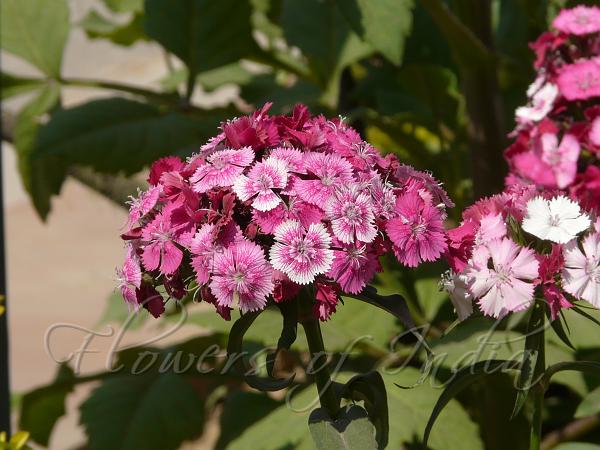|
| Sweet William |
|

|

| File size | 2336297 |
| Original date | 3/6/09 1:02 PM |
| Resolution | 2560 x 1920 |
| Flash | Flash did not fire, auto |
| Focal length | 45.9mm |
| Exposure time | 1/500s |
| Aperture | 6.3 |
| Focus Distance | |
| Metering Mode | Multi-segment |
| Camera make | Panasonic |
| Camera model | DMC-FZ18 |
| Sensor type | OneChipColorArea |
|
|
|
|
Photo: |
Botanical name: Dianthus barbatus Family: Caryophyllaceae (Carnation family)
Sweet William is a species of Dianthus native to the mountains of southern
Europe, with a variety in northeastern China, Korea, and southeasternmost
Russia. It is a biennial or short-lived perennial herb, growing to 30-75
cm tall, with green to glaucous blue-green tapered leaves 4-10 cm long and
1-2 cm broad. The flowers are produced in a dense cluster of up to 30 at
the top of the stems and have a spicy, clovelike scent. Each flower is 2–3
cm diameter with five petals with serrated edges. In wild plants the
petals are red with a white base. There are varieties with red, pink and
white flowers. The plant is widely used in borders, rock gardens. Sweet
William flowers attracts birds, bees and butterflies. Many legends purport
to explain how Sweet William acquired its name, but none is verified. It
is variously said to be named after Saint William of York, William the
Conqueror, or Prince William Augustus, Duke of Cumberland. Another
etymological derivation is that william is a corruption of the French
oillet, meaning "little eye". Sweet William is a favourite name for
lovelorn young men in English folkloric ballads.
| Identification credit: Sultana Niazi | Photographed in Jamia Millia Islamia, Delhi. |
• Is this flower misidentified? If yes,